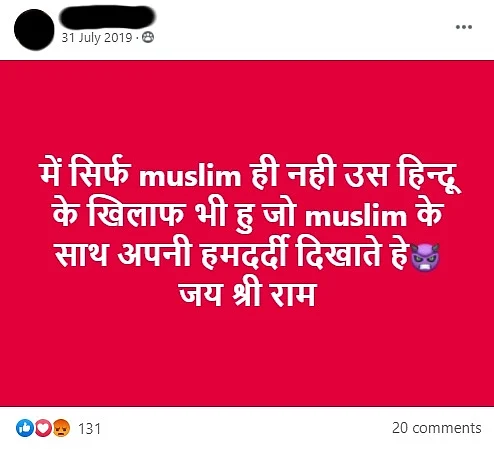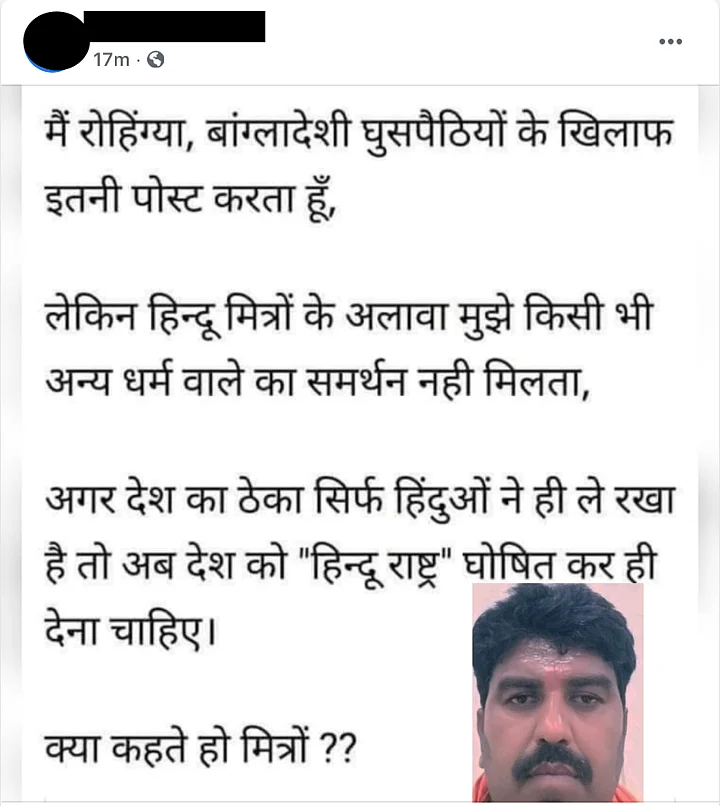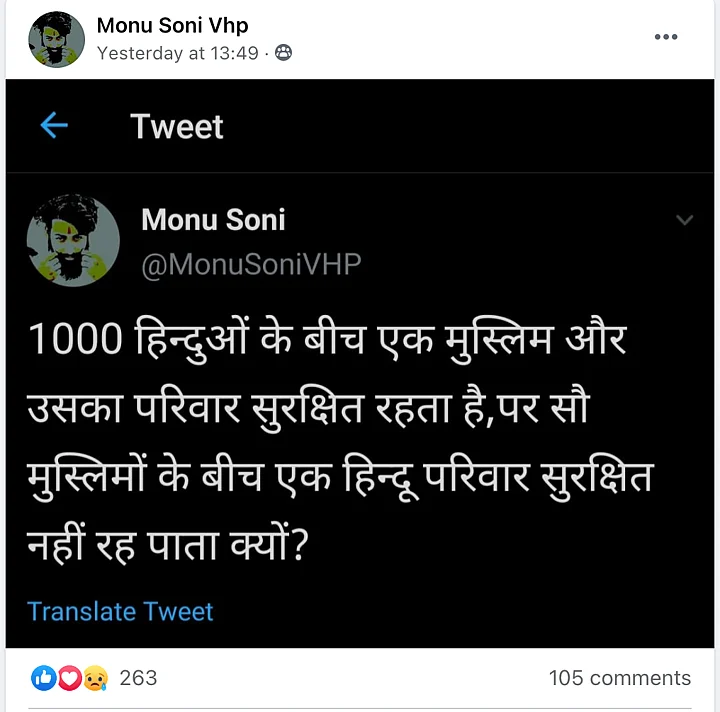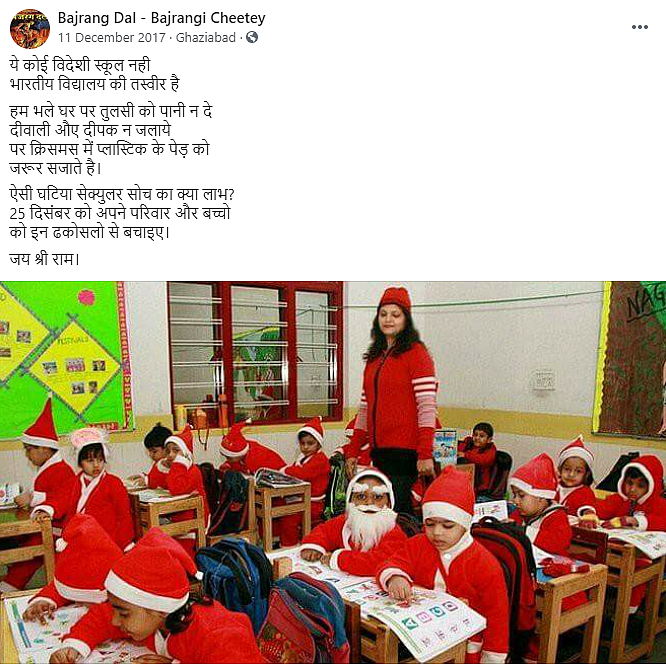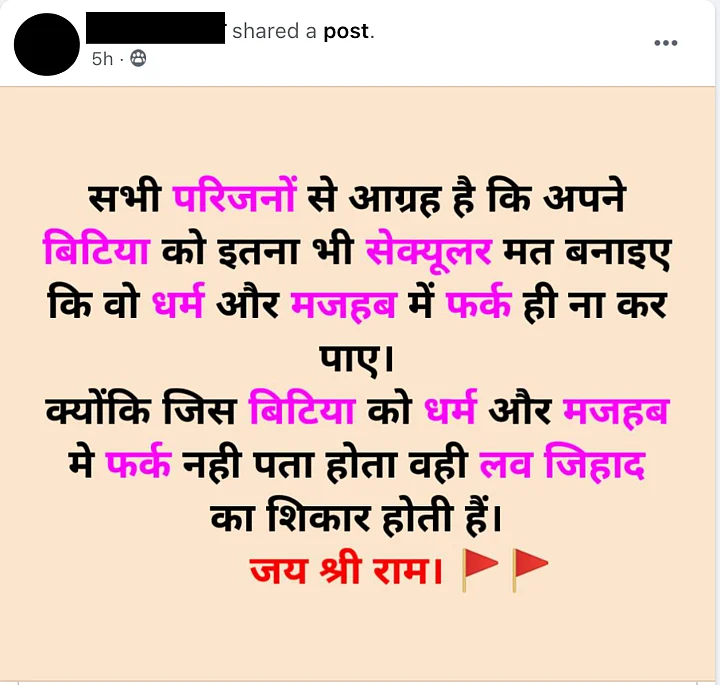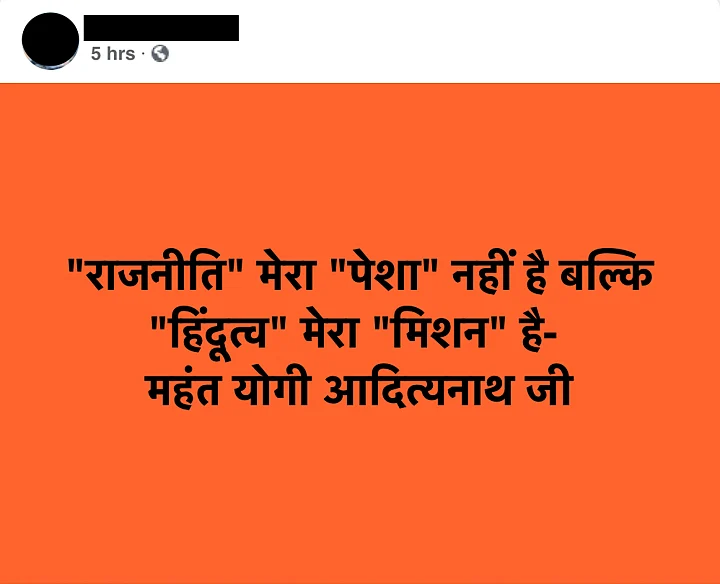Bajrang Dal, the youth wing of Vishwa Hindu Parishad – an organisation of Hindu hardliners – took birth in 1984, as ‘rakshaks’ in the fight for Ram janmabhoomi. Now, it finds representation on Facebook, through multiple groups and pages, often at the intersection of misinformation and hate speech.
A recent report by The Wall Street Journal (WSJ) found that social media giant Facebook refrained from taking action against right-wing groups Bajrang Dal, Sanatan Sanstha and Sri Ram Sena for hate-speech violations, fearing crackdown on its India operations.
However, Facebook’s India head Ajit Mohan told a parliamentary panel during a deposition on Wednesday, 16 December, that there was no need to ban Bajrang Dal on the platform as no content was found violating its social media policy.
This reporter tracked five public groups with large followings, and joined a private group ‘ बजरंग दल GROUP मे कट्टर हिन्दू जुड़े ( BAJRANG DAL)’ with over 98,000 members to look at the kind of information shared under the name of Bajrang Dal.
In subsequent sections of this report, we will illustrate with some examples how these groups are not just spreading hate but are also relying on misinformation to target India's minorities.
Inside Multiple Groups in the Name of Bajrang Dal on Facebook
When we got in touch with the Hindu nationalist group, they said that ‘Bajrang Dal has no official Facebook group or page’, but a quick search on Facebook for Bajrang Dal showed multiple groups and pages which existed in the name of the group and that reiterated the rhetoric of ‘Love Jihad’, ‘Hindu khatre mein hain’ and the need for a ‘Hindu Rashtravad.’
It can be argued that the group has nothing to do with them as claimed, but these groups with following as large as 80,000 and more, do violate Facebook’s Community Standard guidelines but continue to exist on the platform.
These are a few examples but the groups are replete with several such posts, which target minorities, Opposition parties and even call for violence.
The first post of a group that we tracked calls members to invite ‘secular Hindus’ and turn them “kattar.”
Misinformation at the Centre of It All
Amid the current farmer unrest, in a group, ‘Bajrang Dal (बजरंग दल जोडो अभियान | ग्रुप में 11 बजरंग दल वालो को जोड़िये)‘ with over 52,000 members, a user posted a video stating that the farmers’ protest is just a ploy by the Congress to divide Hindus.
He claims that not one farmer had raised slogans like ‘Jai Bharat Mata’ or a ‘Jai Kisan’ but you could hear ‘Khalistan Zindabad’ slogans. The Quint has debunked several such old, unrelated videos that went viral, claiming to show pro-Khalistani slogans at the ongoing farmers’ protest. You can read a few of the fact-checks here, here and here.
Another user shared a 28-minute-long video, in which the user shows a viral video of workers wearing Aam Aadmi Party’s t-shirts, claiming that Delhi Chief Minister Arvind Kejriwal had paid Rs 300 to farmers for protesting. Again, a video relying on misinformation to create a false narrative.
On another group, ‘BAJRANG DAL ALL INDIA OFFICIAL’ with over 17,500 members, a user shared a photoshopped image of a protesting farmer, to claim that a Muslim disguised himself as a farmer and the protest has been ‘hijacked’.
Amber Sinha, the Executive Director at The Centre for Internet and Society, points out that women, sexual and religious minorities are often targets of abusive speech, trolling, doxxing and other manners of censorious speech on social media.
“Already, there isn’t a level-playing field in terms of representation of different demographics and the voice they have on these platforms, and online harassment further impacts how vocal a minority group can be.”Amber Sinha
Sinha also states that this is the reason why user empowerment is important and ‘platforms must be transparent about their community guidelines’.
‘Hindu Khatre Mein Hain’ Amplified on the Platform
Another page called ‘Bajrang Dal’, which is followed by over 58,000 Facebook users, often shares events of the Vishwa Hindu Parishad and its prominent members.
It hosted a video of VHP’s Secretary General Milind Parande speaking about Hindus being attacked by Muslims. He refers to an incident that took place in March in Bihar’s Gopalganj, when a minor boy named Rohit Jaiswal was allegedly killed and thrown into a river, as a “sacrifice” for a new mosque which was to be built there.
The case was widely talked about due to its serious allegations but the claims were later found to be untrue. The Quint had debunked this claim when right-wing website OpIndia had carried a similar report on its website.
In the video, Parande fuels the ‘Hindu Khatre Mein Hain’ sentiment using these unsubstantiated claims to insinuate that Hindus are often targeted and endure violence in Muslim-dominated areas.
Facebook has often stressed on its zero-tolerance policy towards such kind of hate speech. “We do not allow hate speech on Facebook because it creates an environment of intimidation and exclusion, and in some cases, may promote real-world violence,” the Community Standard guidelines clearly note, adding that the tech giant is “committed to removing hate speech any time we become aware of it.”
However, experts have noted its failure to moderate content especially in India.
Torsha Sarkar, a researcher at The Centre for Internet and Society, points out a research by Equality Labs, a South Asian American human rights and technology start-up, which found that Facebook’s content moderation team is not diverse enough.
“Most of its staff belong to socio-economically advantaged groups, so they need to have more people in Facebook from diverse religions and other classes. Their internal teams do not have the resources to cover all Indian languages, which makes them unable to curb content in those languages and cultural contexts.”Torsha Sarkar
Meanwhile, groups and pages with thousands of followers have become breeding grounds for hate speech in India, as their members spread vitriol against Islam and Christianity.
Love Jihad, Cow Vigilantism
The ‘Hindu Khatre Mein Hain’ narrative is furthered by the right-wing conspiracy theory of ‘Love Jihad’, against which several BJP-led states are set to bring out a law. The Bajrang Dal’s page posted that Love Jihad arose out of “Islamic Jihadi mentality,” and that Kanpur had become a centre for such “anti-national activities.”
“The workers of Bajrang Dal will work to teach a lesson to such anti-social elements,” the post states.
To fan the Love Jihad conspiracy, a member of the BAJRANG DAL ALL INDIA OFFICIAL also shared a video of a woman vandalising a milk shop, while calling her husband out for betrayal, with a false claim that a Muslim youth had deceived a Hindu girl into marriage.
However, the couple is actually of the same caste and religion, Chief Superintendent of Police, Juni Indore, Dishesh Agrawal told The Quint, when we had fact-checked the viral claim.
Bajrang Dal members have often been embroiled in controversies around cow vigilantism, with the Allahabad High Court expressing concern over the misuse of the Uttar Pradesh Prevention of Cow Slaughter Act, 1955, “against innocent persons,” in October.
The sentiment is also found on these Facebook groups, with members threatening violence once ‘“गाय वाला” (Yogi) comes to power.”
A Melting Pot of Hate, Violence and Misinformation
Amber Sinha says Facebook’s failure to moderate its content calls for a meta-regulation, which dictate what actions these platforms must take and necessitate transparency in their community guidelines, which as of now have generic definitions and unclear procedures.
“These platforms are becoming a primary source of information and news for a lot of people, so there’s a definite duty of care that they need to exhibit.”Amber Sinha, Executive Director at The Centre for Internet and Society
Members of these groups often share disinformation to further right-wing propaganda and often target the Opposition parties.
You can view an archived version here.
Hindutva supporters find a voice on these groups and pages, spreading hatred and conspiracy theories. In a Facebook live, with over 27,000 views, Sushil Tiwari, who claims to be a Hindutva politician, asks Hindus to “wake up.”
He goes on to claim that Muslims have multiple wives and children because they aim to become 35 percent of the population, upend the Hindu majority and use the money they earn through their professions to fund terrorism.
However, no action was initiated by Facebook against such speech. We have reached out to Facebook for a response and the story will be updated as and when we receive it.
Is Tech Platform’s Action Enough?
These tech giants have often been called out as platforms for hate and divisive politics. Facebook, in response, has reiterated its strong social media policies against hate speech and misinformation.
Yet, measures taken by these policies fail to cleanse the information online and makes the need for regulation, as Sinha has suggested, even more apparent.
“The regulatory paradigm has to be balanced,” Sinha states, “because we run a bigger risk here, that if the regulation is not properly thought through, it can have a chilling effect on speech.”
In legal terms, chilling speech refers to ‘a phenomenon where individuals or groups refrain from engaging in expression for fear of running afoul of a law or regulation.’
“They are profit-making machines and tend to be risk-averse, so they might end up removing more content and chilling speech.”Amber Sinha
The anti-minority rhetoric and propaganda to discredit dissent on online platforms, as seen on several groups and pages in the name of Bajrang Dal, pose a challenge to India’s democracy.
While Mark Zuckerberg has stated before that Facebook shouldn’t be the “arbiter of truth,” it must be held liable for the sheer number of people who engage on the platform daily and contribute to the information ecosystem.
(Not convinced of a post or information you came across online and want it verified? Send us the details on WhatsApp at 9643651818, or e-mail it to us at webqoof@thequint.com and we'll fact-check it for you. You can also read all our fact-checked stories here.)
(At The Quint, we question everything. Play an active role in shaping our journalism by becoming a member today.)

